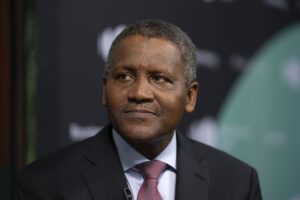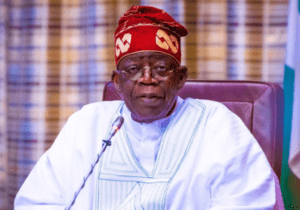Emmanuel Ogebe: Daniel in the lions’ den – How PDP closed INEC’s defence in three hours
I had blogged my hyperventilation at INEC’s failure to bring any of its three defense witnesses to LP’s petition this morning. Little did I expect that the afternoon would hold a spectacular finale.
I reluctantly returned to court for the PDP afternoon session. INEC called it’s witness – an IT director who I had seen tendering exhibits two weeks ago.
Chris Uche, SAN, PDP’s sage and sagacious legal team leader, understatedly brought to the court’s attention a small “house keeping issue”. It was to be the mother of all legal fireworks to bring the “second half” to an exciting end.
Simply put, Uche wanted to know why, if the co-respondents APC and Tinubu were on the same side as INEC, they should cross examine their own side’s witness after him who was on the opposing side?
To understand this properly, “Examination in chief” is what a lawyer does when he questions a witness he brought in support of his case; “Cross Examination” is what the opposing lawyer does when he questions the other party’s witness to challenge his testimony and finally “Reexamination” is what the lawyer who brought the witness asks him again to try and clarify and rectify any vagueness or errors raised by the opposing counsel during cross-examination.
Uche SAN was therefore saying if INEC “Examined” their witness, then PDP “cross-examined” him, then APC and Tinubu’s “cross-examination” of a witness supporting their side will in effect be three “re-examinations!”
INEC, APC and Tinubu’s battery of SANs unleashed barrages of opposition to Uche’s submission.
Olanipekun SAN insisted that his client was not the same as INEC and had more to lose than INEC given the bulk of evidence brought against them including foreign forfeiture and passports.
The court, however, reminded him that Uche was not denying his right to examine the witness but the order of the examinations.
Uche said he wanted Tinubu and APC to “cross-examine” their own witness first, even though he was their own witness, before he cross-examined so that their side did not have three opportunities to repair the damage he inflicted on their witness.
One of the justices submitted that his proposed procedure was only applicable to criminal cases per the Evidence Act.
Uche countered with a proviso that gave discretion to the court where there was no clear cut direction in a sui generis matter such as the election case.
The tide was sweeping against Uche, three different legal teams headed by SANs opposed him. Even a judge seemed to oppose his position. The court audience of hundreds of lawyers were murmuring disapproval at his persistence.
Uche finally cited his research on Bryan A. Garner’s Blacks law dictionary last night which defined “cross examination” as pertaining to an adversary witness – not your own co-respondents’ witness.
He further clarified that the court had not issued an order on this in pre-hearing matters, when it was first raised, as claimed by several of the justices.
As the court rose to deliberate in chambers, I asked my protégé, a fresh grad of my alma matter, how she felt they would rule. “Deny him,” she said.
In about 15 minutes, the court resumed. Based on their research, they stated, an Indian source supported the position of Uche SAN and accordingly his request to cross examine after the other co-respondents was granted.
It was an epic moment of adversarial advocacy triumph. It spoke to the erudition, tenacity and industry of Uche but it also spoke to the fairness, resilience and industry of their Lordships.
Many people are unaware that unlike their counterparts in the west, Nigerian justices do not have legal aides, research assistants or law clerks however so called.
They have to do their own research themselves. They hand write or dictate judgments to secretaries who then type them up.
The only innovation I gather from colleagues who practice here is that some parties provide soft copies of their briefs to the court to enable the secretaries “copy and paste” relevant sections of their briefs in draft judgments.
Last week, while discussing the Nigerian judiciary’s technological backwardness with a western embassy, they indicated they had just began a pilot project for court transcription services in a high court.
For the justices to listen to oral arguments on an unwritten motion, with multifarious submissions and no research assistance and arrive at a decision contrary to what was their first impression was impressive as to their resilience and fair mindedness.
Uche coasted on a whirlwind of success after that. When respondent’s counsel tendered a Tribune newspaper article where INEC reportedly claimed they could no longer do electronic collation on February 23, Uche objected only to page 28 and not to the front page headline “Atiku – a man who’s time has come,” to gales of laughter from all.
Then he tendered last week’s newly released European Election Observers Final report through INEC’s IT Director to the objection of a respondents’ counsel who said he couldn’t tender it as he didn’t produce the report. Ironically the same counsel had just tendered a Tribune newspaper article through the IT Director who also had not produced the article!
Uche got him to read sections of the EU report which were unfavorable to his testimony in what was clearly a major coup for his case.
Despite being only IT Director, the INEC Witness stated that they had followed proper process in declaring a president elect.
However when Uche asked how much APC scored in Abuja, he said he didn’t know.
Surprisingly, INEC’s counsel not only did not re-examine him, they closed their case after this solitary witness. INEC used three hours to defend an election it took four years and N300Billion to conduct.
Tinubu’s counsel announced that they will open their defense tomorrow.
These were my finest moments of the court drama of the four days I have watched over the last few weeks – Uche’s masterful reversal of an overwhelming tide of procedure that tactically helped him give INEC’s witness a technical knockout and Olanipekun’s systematic deconstruction of LP’s Amazon witness.
For all its technological deficits, the full force of Nigerians’ intellectual dexterity and agility amidst scarcity was on display.
Emmanuel Ogebe, Esq, is a prominent US-based international human rights lawyer and Nigeria pro-democracy advocate with the US NIGERIA LAW GROUP in Washington. Last month, he marked the 27th anniversary of his abduction and torture by Gen.
Abacha for demanding an investigation of the assassination of pro-democracy icon Kudirat Abiola over the June 12 election annulment.
His advocacy led to the naming of Kudirat corner by Nigeria house in New York, the US designation of Boko Haram as a foreign terrorist organization and International Criminal Court Prosecutor’s determination of crimes against humanity in Nigeria amongst others.




